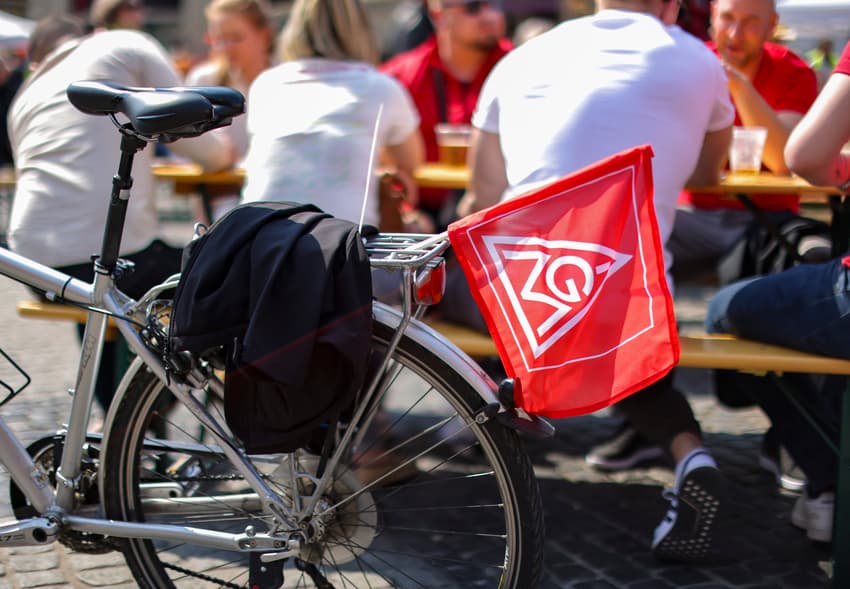German steelworkers agree 6.5 percent pay hike after strike

Tens of thousands of steel workers in western Germany will get a 6.5-percent pay hike this year - the biggest jump in three decades - in a settlement that could set the tone for industry as inflation soars.
The agreed increase would come into effect "from August 1st", the IG Metall union in the region of North Rhine-Westphalia said in a statement Wednesday.
The 68,000 steelworkers in the industrial region would also receive a one-off payment of 500 euros for the months of June and July, the union said.
The outcome of the negotiations was "the biggest increase in wages in the steel industry in percentage terms in 30 years," said IG Metall boss, Joerg Hofmann.
Germany's largest union, IG Metall launched a strike action at steelworks in the west in May after management failed to meet its demands for an 8.2 percent pay increase.
On Thursday at the peak of the movement, around 16,000 workers across 50 firms downed tools, the union said.
READ ALSO: Should foreign workers join a German union?
"Rising inflation" and the "good economic situation" of the steel industry were the basis for IG Metall's demands.
Consumer prices rose at a 7.9-percent rate in Germany in May, a record for the country since reunification in 1990 driven by the outbreak of the war in Ukraine.
The smaller number of steelworkers in the east of Germany, who are also seeking an 8.2 percent pay boost, have yet to reach their own agreement.
Negotiations are currently taking place in a number of sectors. In the textile industry, 12,000 workers in the east of Germany sealed a 5.6 percent pay increase at the beginning of May.
Meanwhile, negotiations covering the auto industry, and mechanical and electrical engineering will begin in November.
Despite the agreed rise the onus was still on government to relieve the pressure on workers form rising prices "in the coming months", IG Metall boss Hofmann said.
Significant wage demands have prompted concerns of a wage-price spiral, where rising pay sustains higher inflation.
The European Central Bank last week said it would raise its interest rates for the first time in over a decade this July as it seeks to stamp out price rises.
Comments
See Also
The agreed increase would come into effect "from August 1st", the IG Metall union in the region of North Rhine-Westphalia said in a statement Wednesday.
The 68,000 steelworkers in the industrial region would also receive a one-off payment of 500 euros for the months of June and July, the union said.
The outcome of the negotiations was "the biggest increase in wages in the steel industry in percentage terms in 30 years," said IG Metall boss, Joerg Hofmann.
Germany's largest union, IG Metall launched a strike action at steelworks in the west in May after management failed to meet its demands for an 8.2 percent pay increase.
On Thursday at the peak of the movement, around 16,000 workers across 50 firms downed tools, the union said.
READ ALSO: Should foreign workers join a German union?
"Rising inflation" and the "good economic situation" of the steel industry were the basis for IG Metall's demands.
Consumer prices rose at a 7.9-percent rate in Germany in May, a record for the country since reunification in 1990 driven by the outbreak of the war in Ukraine.
The smaller number of steelworkers in the east of Germany, who are also seeking an 8.2 percent pay boost, have yet to reach their own agreement.
Negotiations are currently taking place in a number of sectors. In the textile industry, 12,000 workers in the east of Germany sealed a 5.6 percent pay increase at the beginning of May.
Meanwhile, negotiations covering the auto industry, and mechanical and electrical engineering will begin in November.
Despite the agreed rise the onus was still on government to relieve the pressure on workers form rising prices "in the coming months", IG Metall boss Hofmann said.
Significant wage demands have prompted concerns of a wage-price spiral, where rising pay sustains higher inflation.
The European Central Bank last week said it would raise its interest rates for the first time in over a decade this July as it seeks to stamp out price rises.
Join the conversation in our comments section below. Share your own views and experience and if you have a question or suggestion for our journalists then email us at [email protected].
Please keep comments civil, constructive and on topic – and make sure to read our terms of use before getting involved.
Please log in here to leave a comment.